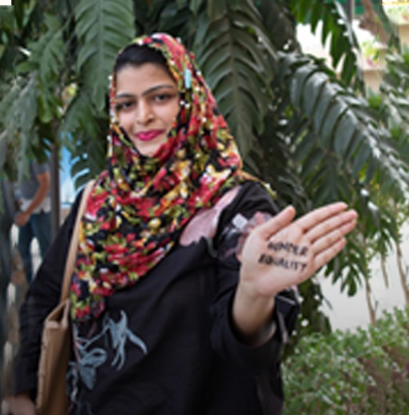


 Back
Back
katcha girls’ middle school:

The Katcha area is in the riverine area next to Indus River in District Ghotki. Factors such as deep forestation, lack of government services and disaster proneness make this area a safe haven for dacoits and bandits. Moreover, due to flash flooding each year, the local population is only able to harvest one crop each year. Lack of education and proper health facilities prevail, leading to poor living standards in this region. We at Engro remain committed to the development of this area and this is evident from the fact we are currently operating 15 schools in this area. In our recent stakeholder interventions and assessments we have concluded that a lack of facilitation and appropriate infrastructure was the main reason behind low enrollment of girls in the schools that we operate. We at Engro have accepted this challenge and in the year 2018, the first girls middle school in Katcha area is now constructed in village Gazi Chachar. This is a groundbreaking initiative taken by Engro Foundation in collaboration with Government of Sindh, the school is constructed in an area that is largely stereotyped for its people’s conservative mindset and reluctance to become part of the mainstream society.
The school will enable female children to learn individually and collaboratively. This will lead to a social uplift of the society as children will get quality education complemented by computer skills and information technology exposure. Families as a whole will benefit as these educated children will impart their knowledge to others in the village about better living conditions in terms of skills, health and hygiene. With government intervention in this area, the security conditions of Gazi Chachar will also get better and people will live an enhanced quality as well as security of life.
This project will affect the middle aged females of the community in 5 villages (namely Gazi Chachar, Tinden Lakhan, Noor Lakhan, Rab Nawaz Chachar and Ubrao Lakhan) directly. It will lead to empowerment of these women in the society. Educated women will raise better families in future and healthier living standards for the family. With government intervention in the village, the security situation of the village will improve and people will develop faith in the government when they are working for their betterment of the people. Moreover, extensive teacher training, e-learning and computer literacy programs will help in improving the quality of education.
To attain sustainability of the initiative, Engro Foundation would be supporting the cost of additional teachers, and teacher training every year. Additionally, Engro Foundation will also work on forming a local organization that will support running of these programs. In this way the program will be more sustainable, as compared to an external organization running the program.
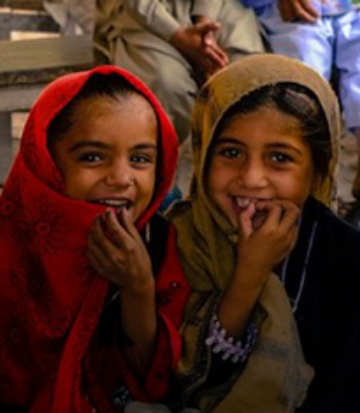
 Back
Back
special training:

This is an Engro foundation dairy development initiative that aims to build capacity of individuals associated with dairy farming. The project is part of the Technical and Vocational Education and Training (TVET) Sector Support Programme (SSP). TVET Sector Support Programme is funded by the European Union and other partners in close collaboration with the National Vocational and Technical Training Commission (NAVTTC) as well as provincial Technical Education and Vocational Training Authorities (TEVTAs) and private sector organizations.
It is a 14 month project that started in January 2018. Engro Foundation along with Engro Corporation and its subsidiaries, building on the sound knowledge base and experience on trainings that Engro Foundation provides in partnership with Engro Foods, specialized trainings have been designed for complete farm supervisor training and partial farm supervisor training for 1250 trainees. The training program utilizes a blended learning approach and includes classroom training, demonstrative training, and workplace based training and exposure trips.
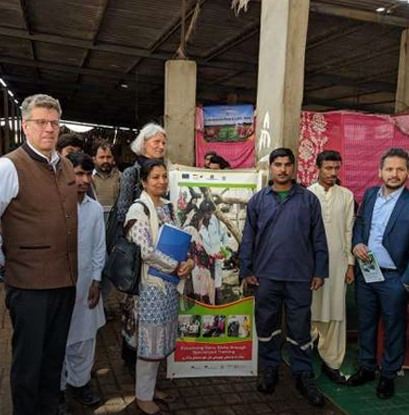
 Back
Back
PAVE

PAVE Pakistan is a 2 year project which aims to make the seed value chain of rice, wheat and vegetables in Pakistan inclusive to smallholder farmers by building their capacities and creating market linkages for them. This initiative works with smallholder farmers, introducing them to seed growing techniques and helping them to become part of the seed supply chain (for rice, wheat and vegetable seed). The partnership brings together Engro Corporation and Mennonite Economic Development Associates (MEDA), which have worked together previously on large-scale dairy development initiatives.
Bebe is a 50 years old female beneficiary of PAVE project from the village of Wasakh Singh, district Gujranwala. After her husband passed away, she wanted to earn a living for herself without becoming a burden on her two sons and their families. Therefore, she started working as a tenant on 5 acres of land in her village. As of now, she has been working farming that land since the last years.
Before the project, she had no idea about certified seeds and had been using home kept seeds on the farm that she used to work on and manage. Since she used home kept seeds for farming her yields were lower than average and her income was low. The traditional cropping pattern of wheat/rice also meant that the cropping was not intensive and did not have any diversification, which are very important concepts for increasing farm based income.
Bebe got to know about the PAVE Project during the initial orientation session in her village. As she had been practicing farming using the traditional methods, she was interested in how she could use modern farming techniques and methods to increase her overall profitability from farming.
Bebe had devoted 10 years of her life working on and managing a 5 acre farm. So, she was very quick to learn and understand the importance of certified seeds and how proper crop management practices can lead to better quality and quantity of yield. The owner of the land of which Bebe works lives in the city of Gujranwala, so whenever Bebe would attend the PAVE training, she would then talk to the owner and convince him to let him implement these techniques on her land.
Upon Bebe’s recommendation, the owner decided to cultivate certified variety of paddy, PK-386. Bebe planted the nursery in total isolation and then transplanted the nursery using the line sowing method to ensure that there were maximum number of plants in the fields. Bebe followed the stage wise recommendations on urea and irrigation cut-off dates and roughing. At the time of harvest, Bebe convinced the owner to have the crop harvested using the Kabouta machine. As a result of her efforts and care, Bebe got 55 maunds/acre as compared to 45-50 maunds/acre before. With a total cost of Rs 30,000/acre, she was able to earn a profit of Rs 35,000/acre. Owing to her successful management of paddy crop which lead to 10% increase in the yield, the owner of the land gave her 2 bags (50 kg each) of paddy this time instead of 1.
Furthermore, she convinced the land owner to diversify the cropping pattern by planting vegetables. So as of now, she has cultivated potatoes on 1 acre, which are yet to be harvested. She has also developed a vegetable (winter) demonstration plot adjacent to her potato crop. She is happy that the now she gets to eat fresh vegetables from her plot.
Bebe, despite having no land of her own, has exhibited leadership through example in her community. She not only convinced the owner of the land on which she works, to use certified seeds and diversify cropping pattern, but also to keep a portion of their paddy produce which will then be processed into seed. Her landlord admires Bebe’s efforts to learn and then practically implement the modern practices to get good yields and returns. Seeing the results of paddy in 2018, the landlord has decided to also use certified seed for the wheat 2019 season.
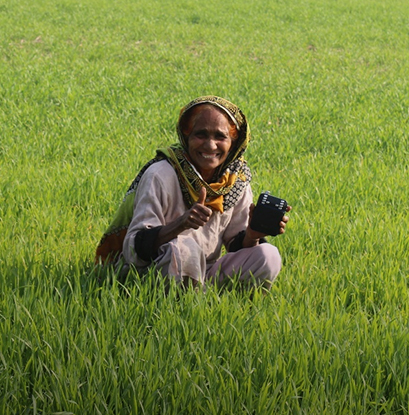
 Back
Back
pave

Javed Iqbal, who resides in the village of Saranwala, Sheikhupura, is a smallholder farmer with 2 acres of his own land. Ever since he started farming, he had only used traditional farming techniques that he had learnt from his father to grow wheat and rice. Owing to the conventional practices and limited farming knowledge, his overall management of the farm was not good, as a result, his yields and returns were low and barely helped Javed to sustain his family.
“There was no sense of achievement and accomplishment in doing farming the traditional way, as practiced and taught by my forefathers.” Javed Iqbal
Risk-averse and shy in nature, Javed was hesitant to become part of PAVE’s initial farmer gatherings in his village. However, when he realized that PAVE will help him to improve his farming knowledge and get better yields, he began to proactively participate in the PAVE Project activities. His commitment can be ascertained from the fact that he was one of the earliest adapters to volunteer his land for participatory research under PAVE. Eager to learn about modern farming practices, Javed not only participated regularly in the training sessions but also practically implemented these techniques on his farm. In 2018, Javed invested in a latest certified variety of rice and followed the advice of PAVE officers on best crop management practices to break away the shackles of conventional farming. Consequently, he not only experienced an increase of 35% in his yield (from 35 maunds per acre to 48 maunds per acre) but also sold his produce to Engro at a premium of Rs 100 per maund (40 kg). To further maximize his returns, he cleaned and processed a portion of his Paddy Seed crop harvests as seed and sold it to his fellow farmers at an even higher premium. Having experienced the benefits first-hand, Javed then also cultivated wheat using high quality seeds and employed modern techniques to ensure the purity of plots. Owing to the high quality of yield, Engro also procured his wheat crop at a premium of Rs 50 per maund. He has now saved a portion of wheat crop harvests, which he aims to process and sell as a seed.
In addition to that, Javed rented 1 acre of land to diversify his traditional cropping pattern by planting Tenda Gourd (vegetable) in addition to wheat and rice. From two crops in a year, he is now getting returns from 3 crops in a year. As a result, his overall farm income has more than doubled in the last year.
The impact of these interventions on his income, has convinced Javed of the benefits of using certified seeds and he has now permanently switched over to use of certified seeds and modern farming practices. He is a registered grower of wheat and rice for Engro and sells some of his produce as seed at premium prices to other farmers. Given his proactive involvement in PAVE activities, Javed now leads and trains other farmers in his community as a master trainer and a community champion.
“We never knew of the amount of profit we could have earned from the small piece of land we had. I think I always underestimated my holding and the return I could earn from it. Now, I practice farming not as a means of sustenance but as a business.” Javed Iqbal. Javed never got any formal education, and to fill this void, he has now admitted his eldest son into a private college in Sheikhupura. This, he claims, is perhaps the greatest investment that PAVE has enabled him to make.
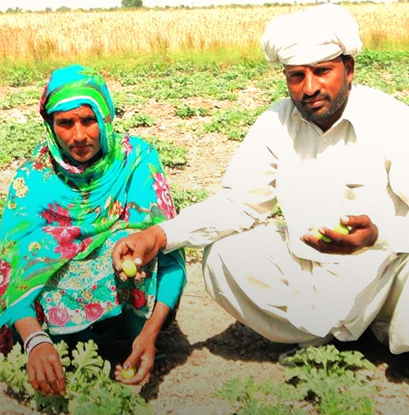
 Back
Back
Tech Karo:

Tech Karo is a training program to teach web development and coding skills to youth from Karachi’s underprivileged backgrounds, with a focus on women. 50 students were graduated, of which 31 were women. 32 students were given placements and internships, with an average income of PKR 10,200. We are building upon the success of this program by committing to continuing and expanding upon the original project for the next 3 years
Noreen comes from a humble background of 6 siblings and a retiree father who runs a small neighborhood shop. She was a B.Comm graduate and employed as a teacher, when she came across Tech Karo and gained admission in the first batch.
Noreen initially struggled with coding, finding it boring. That changed as she got past the initial hurdles, and interest blossomed as she started realizing the importance of website development and how crucial a role good coding and user interface design play in creating well regarded websites.
Noreen believes that learning coding skills is an incredible asset for the 21st century, and for women even more so: if they can’t work at an office for personal reasons, they still have the choice of working as a freelancer from home. She too faced initial resistance on this account, eventually being the first female in her family to receive permission.
Another important part of her success was the mentoring she received, as it assisted greatly in furthering her studies and eventual professional career. Noreen’s now interning at a well-regarded Karachi based technology company, which she combines with tuitions to young children as well as house chores
“Tech Karo changed my life, now I feel that I am on the right track, from which I will not digress. My dream is to support my family, especially my parents, so that my father no longer needs to work. He worked to hard to put me through school, and I would like to return it in a small way. I would also to see a change in the youth in my area, especially the women. Just like Tech Karo gave me the opportunity, I too would like to return the favor.”
